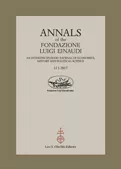The essay reviews the changing relationship between economic conditions and the ideas of happiness over the long period, from hunter-gatherers to the present age. It argues that cultural aspects, in their interplay with social conditions and institutions, are crucial for understanding the rise of the modern world, and it proposes an interpretative schema within which to explain the origins of capitalism and the Industrial Revolution. On this basis, the article calls for closer integration between economics and economic history, on the one hand, and psychology, ethics and politics on the other: it is vital to gain better understanding not only of the past but also of our times, given the widening gap between technological progress and ethics.



